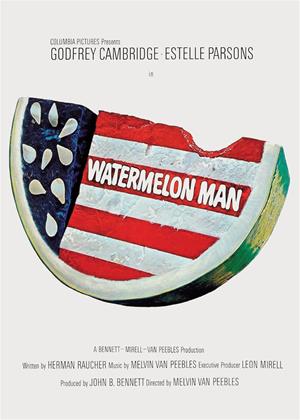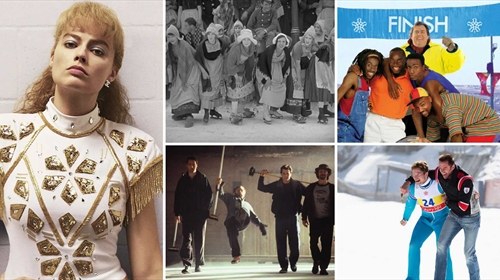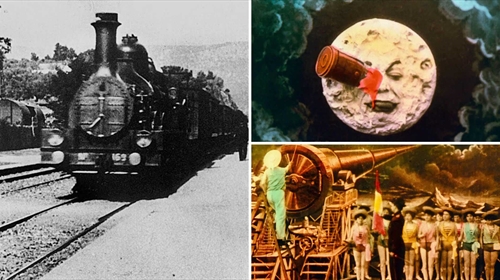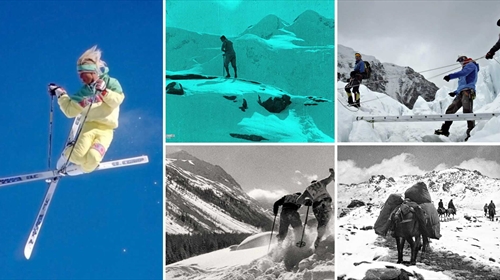For a long time, cinema viewed television as an unwelcome competitor. Now, they are allies in a battle for audiences with streaming platforms. By offering over 10,000 features on DVD, Blu-ray and 4K, Cinema Paradiso is doing its bit, as the best way to watch a film on disc is on a good size television screen that does full justice to the pristine quality of the imagery. Nine decades have passed since the BBC broadcast its first programmes across the London area from its Long Acre studio in Covent Garden. So, let's see how the movies have depicted TV down the years.
In the first part of Cinema Paradiso's survey of the link between film and television, we explored movies set in newsrooms and pictures with a horror and sci-fi slant. We should also highlight the fact that cinema and TV have been cross-pollinating for decades, as you can see from our articles on the Top 10 Films Turned into TV Series and the reverse process, From Small Screen to Silver Screen.
Sitcoms and Soaps

Having found fame through the TV show, The Monkees (1966-68), it's somewhat apt that Micky Dolenz, Davy Jones, Peter Tork and Mike Nesmith wind up in a glass fish tank at the end of Bob Rafelson's Head (1968), as it's the perfect metaphor for television celebrity. Another small-screen musical staple to make the transition to cinema was Mike Judge's Beavis and Butt-Head (1993-2011), which was centred around a pair of couch potatoes from Highland, Texas who spend their days making snarky remarks about the videos on MTV. They did wander out of their comfort zone in Beavis and Butt-Head Do America (1996), however, which would make for a splendid triple bill with Penelope Spheeris's Wayne's World (1992) and Stephen Herek's Wayne's World 2 (1993), which centres on the public access show hosted by Aurora. Illinois slackers. Wayne Campbell (Mike Myers) and Garth Agar (Dana Carvey).
The humour comes from a darker place in Martin Ritt's The Front (1976), in which screenwriter Walter Bernstein recalled his experiences under the Hollywood blacklist following the Cold War HUAC investigation into Communism in the American film industry. Zero Mostel excels as Hecky Brown, the TV comic whose future depends on him uncovering the names of the banned writers using small-time loser Howard Prince (Woody Allen) as a 'front' for their work. Desperation to make the big time drives Rupert Pupkin (Robert De Niro), as he kidnaps comedian Jerry Langford (Jerry Lewis) in the hope of landing a spot on his chat show in Martin Scorsese's The King of Comedy (1983).
Frustration also prompts struggling Africn American writer Pierre Delacrois (Damon Wayans) to teach bigoted boss Thomas Dunwitty (Michael Rapaport) a lesson in Spike Lee's Bamboozled (2000) by writing a TV show that exposes racism in the United States. Much to his dismay, however, Mantan: The New Millennium Minstrel Show becomes a rating smash and makes stars of street performers Womack (Tommy Davidson) and Manray (Savon Glover), whose small-screen characters were based on Willie 'Sleep'n'Eat' Best and Mantan Moreland, who can respectively seen in Frank R. Strayer's The Monster Walks (1932) and Melvin Van Peebles's Watermelon Man (1970), which features a standout turn by Godfrey Cambridge, as the prejudiced white slob who become black overnight.
Weird Al Yankowic comes up with some wacky programme ideas of his own after his uncle wins Channel 62 in a card game in Jay Levey's UHF (1989), while writer David Duchovny learns the hard way while trying to pitch a show to producer Sigourney Weaver in Jake Kasdan's satire, The TV Set (2006). However, narcissistic star Jack Wyatt (Will Ferrell) gets more than he bargained for in Nora Ephron's Bewitched (2005) when he unwittingly hires real-life witch Isabel Bigelow (Nicole Kidman) to play Samantha Stephens to his Darrin in a remake of the revered William Asher sitcom, Bewitched (1964-72), in which Dick York had originated the role of Darrin opposite the marvellous, nose-wrinkling Elizabeth Montgomery.
Speaking of TV sets, Peter Sellers gives the Oscar-nominated performance of his career in Hal Ashby's exceptional adaptation of Jerzy Kosinki's Being There (1979), as Chance, the gardener who has spent so long in an old gentleman's Washington, DC mansion that his only knowledge of the outside world comes from television. Mistakenly dubbed Chauncey Gardiner by tycoon Ben Rand (Best Supporting winner Melvyn Douglas), the holy innocent becomes the darling of the political establishment and Mike Judge mines the same theme in Idiocracy (2006), which sees the buffoonish Joe Bowers (Luke Wilson) wake in 2505 after a bungled hibernation experiment to find society so dumbed down that he is now the sharpest tool in the box. However, Matthew Broderick encounters a much more dangerous loose cannon when Jim Carrey comes to hook him up to the underground network in Ben Stiller's The Cable Guy (1996).
Long before Strictly Come Dancing became a global phenomenon. TV dance shows were regarded as rather tacky. Federico Fellini captures the mood to perfection in Ginger and Fred (1985), which is beautifully played by Giulietta Masina and Marcello Mastroianni as the Rogers and Astaire impersonators who are persuaded to take to the floor again three decades after their retirement. Old-style variety shows like Sunday Night At the London Palladium (1960-66) were also once an audience magnet and Jim Henson satirised the format to a tee in The Muppet Show (1976-81), which Cinema Paradiso users can enjoy in the form of three 'Very Best Of' compilations. However, Peter Jackson skewered the format with devilish wit in Meet the Feebles (1989) and grown-ups should take note that his account of the events that culminated in the Peebles Variety Massacre are most definitely NOT for family viewing.

Thankfully, there's nothing to stop viewers of all ages from enjoying James Bobin's The Muppets (2011), in which Jason Siegel and Amy Adams try to reunite Kermit, Fozzie and Miss Piggy for a telethon to prevent oil magnate Chris Cooper from demolishing the Muppet Theatre. The Muppet magic is also readily evident in Brian Henson's The Happytime Murders (2018), although the faces may not be as readily familiar, as puppet detective Phil Phillips is paired with LAPD officer Connie Edwards (Melissa McCarthy) to discover who keeps bumping off retired sitcom stars in a neverland that contains echoes of Robert Zemeckis's Toontown in Who Framed Roger Rabbit (1988).
Staying in the world of children's television, washed-up tea-time favourite Robin Williams seeks revenge on Edward Norton for luring away his audience while dressed as a pink rhino in Danny DeVito's Death to Smoochy (2002). There's also an edge to the comedy in Abe Forsythe's Little Monsters (2019), as tot favourite Teddy McGiggle (Josh Gad) proves to be nothing like his screen persona after zombies take over Pleasant Valley Farm. Fortunately, Fred Rogers (Tom Hanks) lives up to his genial billing when cynical hack Tom Junod (Matthew Rhys) comes to profile him in Marielle Heller's charming fact-based drama, A Beautiful Day in the Neighborhood (2019).
Soap operas have been firm favourites with audiences since ABC latched on to the Grace Metalious novel that had been filmed by Mark Robson in 1957 in order to produce the groundbreaking Peyton Place (1964-69). Hundreds of shows have followed in its wake, including Days of Our Lives, which starred Joey Tribbiani (Matt LeBlanc) in Friends (1994-2003). In Sydney Pollack's Tootsie (1982), the show that actor Michael Dorsey (Dustin Hoffman) has set his sights on is Southwest General and he drags up as Dorothy Michaels to land the role of hospital administrator Emily Kimberly (a tactic that Stewie Griffin also employs in becoming Karina Smirnoff in order to star in Jolly Farm Revue in the 'Go, Stewie, Go!' episode from Season Eight of Family Guy, 1999-).
Scribe John Candy gets a shot at winning a Daytime Emmy when he bumps his head in Tom Mankiewicz's Delirious (1991) and finds himself part of the Beyond Our Dreams world, which he can control with his typewriter. Writer Whoopi Goldberg has much less say in what happens on The Sun Also Sets after ambitious actress Cathy Moriarty sleeps with producer Robert Downey, Jr. in Michael Hoffman's Soapdish (1991) and persuades him to turn the show's popular mainstay, Sally Field, into a monster by having her mistreat waif Elisabeth Shue and struggle to deal with the return of the nemesis Field had once had fired, Kevin Kline.
Just about everyone on the show producer by Christopher Plummer has a skeleton in the cupboard in Peter H. Hunt's adaptation of Danielle Steele's Secrets (1992). But he soon finds himself risking his own reputation by falling for Manhattan's newest star, Stephanie Beacham, and the complicated love life of EastEnders star Barbara Windsor is laid bare in Dominic Leclerc's Babs (2017). Samantha Spiro takes the title role having also played Windsor in Terry Johnson's Cor, Blimey! (2000), which chronicled her tricky relationship with Carry On co-star Sidney James (Geoffrey Hutchings).
Sid is up to his shady tricks as the purveyor of Bonko washing tablets in Lance Comfort's Make Mine a Million (1959), which sees him persuade National Television make-up artist Arthur Askey give his product a free plug by interrupting a live lead. British commercial television was still only four years old when this romp was released, but only the BBC manages to subsist without adverts nowadays. There are also several specialist shopping channels for the dedicated spender. Among them is Good Buy, which is facing something of a downturn in Steven Herek's Holy Man (1998). However, executive Jeff Goldblum's prayers are answered when Eddie Murphy proves to be a natural born salesman. Cranky Shop-A-Lot producer Whoopi Goldberg also gets her Christmas wish in the form of Nigel Hawthorne in Peter Werner's Call Me Claus (2001), which followed in the festive footsteps of Richard Donner's Scrooged (1988), in which Bill Murray has an eventful evening after insisting that his cast work late for a live production of A Christmas Carol.
Games, Chat and Reality
Audience participation had long been a part of variety shows and early radio stations got listeners involved by sending in requests and answers to quiz questions. The game show first appeared in 1938, with BBC TV's Spelling Bee pipping NBC radio's Information Please to the airwaves. While the basic format has changed little over the years, novelty has always been the name of the game show game and cinema has reflected the shifts since the days of Paul L. Stein's 20 Questions Murder Mystery (1950), which can be rented from Cinema Paradiso on Renown's Crime Collection, along with Leslie S. Hiscott's Inside the Room (1935) and Robert S. Baker's Blackout (1950).

We've already mentioned Robert Redford's Quiz Show and the extent to which contestants could become national celebrities is reinforced by Paul Thomas Anderson's Magnolia (1999), as 'Quiz Kid' Donnie Smith (William H. Macy) continues to struggle with the fallout of his time on What Do Kids Know?, as host Jimmy Gator (Philip Baker Hall) asks questions of the latest child prodigy. Stanley Spector (Jeremy Blackman). A chance to appear on her favourite quiz show prompts Sara Goldfarb (Ellen Burstyn) to go on a crash diet so that she can fit into her favourite red dress in Darren Aronofsky's Requiem For a Dream (2000), while Bristol University student Brian Jackson (James McAvoy) risks alienating his working-class mates in Southend when he lands a place on the University Challenge team in Tom Vaughan's Starter For 10 (2006).
George Clooney profiles one of American television's most contentious innovators in the Charlie Kaufman-scripted Confessions of a Dangerous Mind (2002), in which Sam Rockwell plays Chuck Barris, the creator of The Dating Game and The Gong Show. A dating show also prevents Jeremy London from proposing to girlfriend Claire Forlani in Kevin Smith's Mallrats (1995), as she has promised to appear on father Michael Rooker's Truth or Date show after a female contestant had died during a charity swim.
In the quest for ratings, station executives have often sought to offer increasingly outrageous entertainment. But cinema has blithely gone beyond the realms of possibility to present perilous programmes like The Big Hunt, which sees Ursula Andress and Marcello Mastroianni bumping off fellow contestants while competing for a big prize in Elio Petri's The 10th Victim (1965). A similar concept was explored in Yves Boisset's The Prize of Peril (1983), which has long been overdue an American remake, and Paul Michael Glaser's The Running Man (1987), an adaptation of a Stephen King story that makes Arnold Schwarzenegger the quarry on the highest-rated TV show in history.
Kill or be killed is also the name of the game for the sextet competing in the grim reality show in Daniels Minahan's Series 7: The Contenders (2001), while six more willing victims dice with death on the Russian roulette show devised by Eva Mendes in Bill Guttentag's Live! (2007). Three school friends go head to head for the $200,000 prize in the streetfighting reality show that drives Kang Wu-suk's Fists of Legend (2013), while it's hell on wheels for those in the driving seat in Paul Bartel's Death Race 2000 (1975) and Paul W.S. Anderson's 2008 remake Death Race, as well as in Bill Kopp's Tom and Jerry pastiche, The Fast and the Furry (2005).
The most profitable pictures to exploit the human hunt format, however, are those spun off from Suzanne Collins's bestsellers, with Caesar Flickerman (Stanley Tucci) hosting the TV coverage of the murderous mayhem orchestrated by Head Gamemaker Seneca Crane (Wes Bentley) in Gary Ross's The Hunger Games (2012) and Francis Lawrence's The Hunger Games: Catching Fire (2013), The Hunger Games: Mockingjay, Part One (2014) and The Hunger Games: Mockingjay, Part Two (2015).

Talk shows have branched out in many directions since Joe Franklin hosted the first one in 1951. Steve Allen perfected the form on The Tonight Show, which has remained on the NBC schedule since 1954 and has featured in several movies. Daytime favourites like The Oprah Winfrey Show (1986-2011) often command even larger audiences and Kathy Bates parodies the hosting style to amusing effect as Kippie Kann in Nick Hurran's Little Black Book, which follows researcher Stacy Holt (Brittany Murphy) as she scrolls through the messages on the PalmPilot belonging to her boyfriend, Derek (Ron Livingston). Local talk show host Bernice Graves (Bette Midler) also decides to take matters into her own hands in Helen Hunt's directorial debut, Then She Found Me (2007), when she seeks out elementary teacher April Epner (Hunt), whom she had given up for adoption as a baby four decades earlier.
Michael Haneke provides a variation on the theme by making Daniel Auteuil's guilt-ridden character the host of a literary chat show in Hidden (2005), while local channel chief Teodor Corban comes to regret suggesting a talk show to mark the 30th anniversary of the overthrow of Romania's Communist leadership in Corneliu Porumboiu's 12:08 East of Bucharest (2006). Facing up to reality brings disgraced TV personality Pierce Brosnan to the roof of the Toppers Building in London on New Year's Eve. However, he soon discovers that he's not alone, as Toni Collette, Imogen Poots and Aaron Paul have also come to embrace their destinies in Pascal Chaumeil's adaptation of Nick Hornby's novel, A Long Way Down (2014).
Morning show researcher Katherine Heigl gets off to a bad start with the cynical Gerard Butler when he is hired to do a relationships spot by her Sacramento station in Richard Luketic's The Ugly Truth (2009). But his self-obsession pales beside that of Oprah fan Kristen Wiig, who blows $15 million of her lottery win on enough air time to broadcast 100 episodes of a show centred exclusively on herself in Shira Piven's Welcome to Me (2014). Staff writer Mindy Kaling is convinced that presenter Emma Thompson is every bit as egotistical. However, when station new broom Amy Ryan orders Thompson to shape up or ship out, she suddenly becomes heavily reliant on Kaling and her fellow scribes in Nisha Ganatra's Late Night (2019). The same year saw Arthur Fleck (Joaquin Phoenix) make a dramatic debut on the Murray Franklin (Robert De Niro) chat show that had aired clips of his failed stand-up routine in Todd Phillips's origins story, Joker (2019), which earned Phoenix and composer Hildur Guðnadóttir a hat-trick of the Golden Globe, Oscar and BAFTA awards.
The tabloid talk show originated in the States with Les Crane in the mid-1960s, with successors like Geraldo Rivera frequently cameoing as themselves in such pictures as Robert Zemeckis's Contact (1997), Mike Nichols's Primary Colors (1998) and Phil Traill's All About Steve (2009). Jerry Springer, the King of Confessional Television, got to play a version of himself in Neil Abramson's Ringmaster (1998), which anticipated Peter Orton's Jerry Springer: The Opera (2004) - in which the title role is taken by David Soul - which castigates both the purveyors and the consumers of so-called Trash TV.
Following the briefest of detours to talent shows both fictional (Paul Weitz's American Dreamz, 2006) and factual (Havana Marking's Afghan Star, 2009), we arrive at the most divisive kid on the small-screen block - reality television. Although it seems a relatively new phenomenon, the unscripted format dates back to such early TV shows as Queen For a Day (1945-64), which borrowed the premise of Frank Capra's Lady For a Day (1933) - which he remade as Pocketful of Miracles (1961) - in which street vendor May Robson (Bette Davis in the retool) is given a makeover to convince her visiting daughter that she's doing well for herself by gentleman hoodlum Warren William (Glenn Ford).

In Britain, director Paul Almond put a reality spin on the documentary with Seven Up! (1964), which followed the fortunes of 14 children born in 1957 and launched a franchise that continued with Michael Apted at the helm until 63 Up in 2019. All nine series are available to rent from Cinema Paradiso, which reaffirms what a remarkable selection of titles we have on offer at the click of a mouse. Being in the public eye had different effects on the Up participants and Cliff Spab (Stephen Dorff), Joe Dice (Jack Noseworthy) and Wendy Pfister (Reese Witherspoon) find it tough to come to terms with having their experiences as hostages broadcast by the SPLIT terrorist group in Jefery Levy's S.F.W. (1994).
Make-up artist Veronica Forqué becomes involved with scar-faced reality host Victoria Abril through her catatonic boyfriend and maid Rossy De Palma's rapacious thief boyfriend in Pedro Almodóvar's Kika (1993). Seeking to boost his own profile, tabloid reporter Wayne Gale (Robert Downey, Jr.) ensures that the murder spree perpetuated by Mickey (Woody Harrelson) and Mallory Knox (Juliette Lewis) makes it on to the box in Oliver Stone's Natural Born Killers (1994), which was scripted by Quentin Tarantino. Seeking sensationalism for his In Your Face channel in Ben Stiller's Reality Bites (1994), a small-time executive (Stiller) hopes to persuade budding videographer Winona Ryder that she's better off entrusting clips of her Generation X friends to him than John Mahoney, the host of the Houston morning show for whom she currently works.
Amateurs weren't alone in the 1990s in creating their own versions of the truth, as the President of the United States tries to blur the reality line in David Mamet's Wag the Dog (1997) when a scandal threatens to break over him two weeks before an election and he requires White House aide Robert De Niro to fill the news bulletins with stories about a victorious war that is actually being stage-managed from the comfort of a studio by Hollywood producer Dustin Hoffman. De Niro finds himself on the wrong side of the cameras in Tom Dey's Showtime (2002), as he plays an LAPD detective whose punishment for a snafu is to appear with motor-mouthed partner Eddie Murphy on a cop-based reality show produced by Rene Russo.
The launch of Big Brother in the Netherlands in 1997 transformed the nature of reality television, although French-Canadian film-maker Michel Poulette had anticipated the notion of a 24/7 focus on the life of an everyman in Louis 19, King of the Airwaves (1994). This provided the inspiration for Ron Howard's EDtv (1999), in which True TV producer Ellen De Generes selects video store clerk Matthew McConaughey to live his life on screen. Featuring a standout turn by Jim Carrey, Peter Weir's The Truman Show (1998) riffed on the reverse notion of someone not acting up for the camera because they have no idea they're going live into the living rooms of America.
Ex-porn star Sarah Michelle Gellar strives to launch her own reality project in Richard Kelly's Southland Tales (2006), while the central 'Reality Television' segment of John August's The Nines (2007) sees producer Hope Davis muddy the waters so that writer Ryan Reynolds and actress friend Melissa McCarthy fall out over the pilot for a new series. But we end with the insurance salesman played by Joel Murray in Bobcat Goldthwait's God Bless America (2011) because reality TV is just one of the things that grinds his gears. He also hates talk radio, the Internet and celebrity culture. But it's episodes of American Superstarz and a reality show about a spoilt teenager that tips him over the edge and he embarks upon a battle for the nation's soul with gun-toting high-school accomplice, Tara Lynne Barr.

































































































